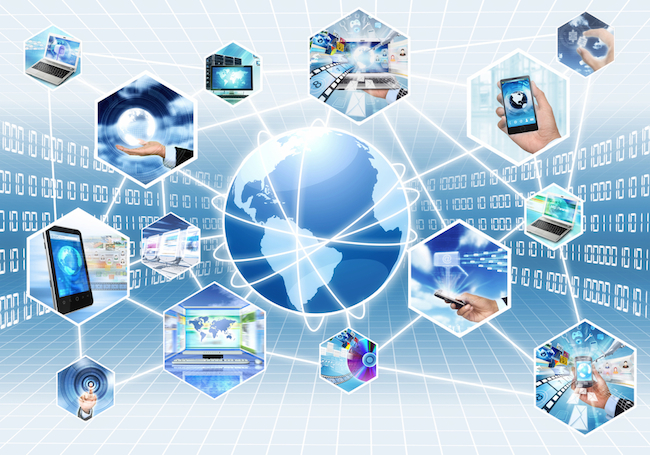The Internet in 2025: Blazing Speeds Could Enable Futuristic Tech

What if the Internet were 100 times faster than it is today? How would this super-high-speed connectivity affect the economy, health care and education?
The Pew Research Center, a nonprofit organization in Washington, D.C., recently posed these questions to experts in a range of Internet-related fields. Predictions about what the future Internet landscape could look like in the year 2025, with blazing-fast connectivity, ran the gamut from pragmatic to fantastical. While some experts envisioned a future in which business meetings take place via 3D hologram, another predicted the rise of immersive 3D pornography.
"These experts generally believe that, if technological change advances as they expect, it will bring about the types of connectivity humans have been dreaming about for quite some time," said Janna Anderson, co-author of the new Pew report and director of the Imagining the Internet Center at Elon University in North Carolina. [10 Technologies That Will Transform Your Life]
Virtual world
The specific types of applications that might be possible with a faster Internet are really anyone's guess, but many of the more than 1,400 experts canvassed for the report had similar predictions for the future, Anderson told Live Science.
Many experts focused on the emergence of "telepresence," which could enable people to be together virtually even though they are physically far apart. Imagine playing in a virtual band with people from around the world, or having Thanksgiving dinner with family members who live on the other side of the country. These are a few of the ideas put forth in the report by Marti Hearst, a professor in the School of Information at the University of California, Berkeley.
"These ideas aren't new, but they will finally work well enough if given high enough bandwidth," Hearst wrote in response to the researchers' question about future connectivity.
Get the world’s most fascinating discoveries delivered straight to your inbox.
Another thing that could benefit from more bandwidth is augmented reality. Internet experts are enthusiastic about the possibility of a future filled with avatars, interactive gaming and holograms.
Of course, not everyone who responded to the researchers' queries focused on the opportunities for entertainment with faster Internet. Some, like Alison Alexander, a professor of communications at the University of Georgia, think better bandwidth could help solve practical real-world problems, such as alleviating inefficiencies inherent in bureaucracies.
Robotic revolution
Still other experts focused their responses on a different theme: how the increased speed of computing could bring humans and machines closer together.
"High-bandwidth and high-definition communication will allow the emergence of what we'll call emotional computing," wrote David Orban, CEO of the New York-based software company Dotsub. "Facial expressions, subtle changes in voice stresses, gestures, will all be part of how we will communicate among each other for work and fun across any distance, with computers and software platforms understanding these components and being able to adapt to them, facilitating the efficient reaching of goals and objectives." [Science Fact or Fiction? The Plausibility of 10 Sci-Fi Concepts]
Humans and machines will also be brought closer together by the so-called Internet of Things, some experts predicted. In a world with faster Internet, smart devices won't be trendy or superfluous; they'll be the norm, according to Hal Varian, chief economist at Google.
One industry that will see a huge impact if this prediction were to come true is health care, Varian said. Internet-enabled devices, for instance, could allow for continuous health monitoring outside of hospitals.
"You will be able to purchase health-monitoring systems just like you purchase home-security systems," Varian wrote in the report. "Indeed, the home-security system will include health monitoring as a matter of course. Robotic and remote surgery will become commonplace."
And Varian wasn't the only expert to discuss what a faster Internet could do for the health care industry. Judith Donath, a fellow at Harvard University's Berkman Center for Internet and Society, predicts that in the future, chronically ill and elderly patients "will be released from hospitals with a kit of sensors that a home nurse can use." She also said that the reach of health care will expand into unexpected territories, with local drugstores carrying out simple surgeries and offering what she called "fast meds — analogous to fast foods."
Keeping up with the changes
Similar advancements might be made in the field of education, according to some of the survey respondents. Apps that track and aid in every learning ability or disability are likely in the future, wrote Breanne Thomlison, founder of BTx2 Communications, a marketing and strategies firm. In fact, the whole system of education in the United States, and elsewhere in the world, will likely have to change to keep up with these fast-paced technological advancements, some experts said.
"Time in school will need to radically change, since the talking-head, expert teacher is less and less valuable," wrote Ed Lyell, a professor of business and economics at Adams State University in Alamosa, Colorado. "The role of teacher-coach will be even more important yet require a different emotional and intellectual skill set than that which most educators now possess."
The Pew Research Center report also noted several other possible trends, such as the belief that superfast Internet service in some parts of the world, but not others, could generate a new digital divide.
"We should not expect these bandwidth increases to be evenly distributed, and many who cannot afford access to increased bandwidth will be left with low-bandwidth options," wrote Rex Troumbley, a graduate research assistant in the Department of Political Science at the University of Hawaii at Manoa. "We may see a new class divergence between those able to access immersive media, online telepathy, human consciousness uploads and remote computing, while the poor will be left with the low-bandwidth experiences we typically use today."
But experts say that such inequalities, as well as the exciting new applications inspired by superfast Internet, won't come about overnight. These developments will take time to emerge — perhaps longer than a decade, many experts said.
"If you held them to it, [the expert] would probably say they wouldn't bet any money on all of that being the reality in 2025, but they do imagine that we'll be closer to it because they are already witnessing early forms of such things," Anderson said.
The full report from the Pew Research Center was published online today (Oct. 9).
Follow Elizabeth Palermo @techEpalermo. Follow Live Science @livescience, Facebook & Google+. Original article on Live Science.


